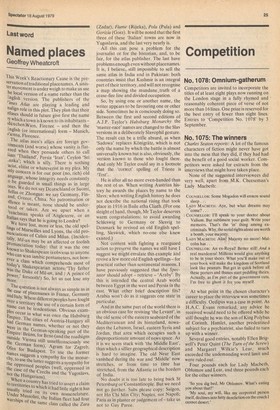Last word
Named places
Geoffrey Wheatcroft
This Week's Reactionary Cause is the pre servation of traditional placenames. A sinister movement is under weigh to make us use he local version of a name rather than the inglish version. The publishers of the riines Atlas are playing a leading and nalign role in this plot. They plan that their itlases should in future give first the name )y which a town is known to its inhabitants — vIiinchen,Wien, Firenze — and then the inglish (or international) form — Munich, Vienna, Florence. The atlas men's allies are foreign gov 3'nments (and worse) whose vanity is flatered when they persuade others to call ;iam 'Thailand', Persia 'Iran', Ceylon `Sri -anka'; which is silly. There is nothing 'acist, elitist or whateverist in my plea. My mly concern is for our poor (no, rich) old anguage, whose integrity needs constantly o be guarded in small things as in large ones. We do not say Deutschland or Suomi, iellas or Zhonglia: we say Germany, Finand, Greece, China. No patronisation or iffence is meant, none should be undertood or taken. Are we upset when a 'renchman speaks of Angleterre, or an Italian says that he is going to Londra? We have lost, more or less, the old spellings of Marseilles and Lyons, the old pro nunciations of Calais and Milan. (Inciden tally, Mil-an may be an affected or foolish Pronunciation today: that it was the one known to Shakespeare is obvious to anyone Who can scan iambic pentameters, not however a class which comprehends most of today's Shakespearian actors; 'Thy father was the Duke of Mil-an, and / A prince of Power,' forsooth!) So, let us not lose any more.
The question is not always as simple as in the case of placenames in France, Germany and Italy. Where different peoples have fought over a territory the use of a certain form of name can be tendentious. Obvious examples occur in what was once the Habsburg empire. The cities of Austria-Hungary all had German names, whether or not they Were in the German-speaking part of the empire: Briinn, for Brno (and the roadsigns outside Vienna still unselfconsciously use the German form), Agram for Zagreb, Ofen for Budapest. To use the former names suggests a sympathy for the monarchy, to use the latter suggests a sympathy for the oppressed peoples (well, oppressed in the case of the Czechs and the Yugoslays, not the Hungarians). When acountry has tried to assert a claim to territories to which it had little right it has usually tried on its own nomenclature. Under Mussolini, the Italian fleet had four warships of the same class called the Zara (Zadar), Fiume (Rijeka), Pola (Pula) and Gorizia (Gorz). It will be noted that the first three of these 'Italian' towns are now in Yugoslavia, and the last very nearly is.
All this can pose a problem for the journalist or for the historian, and, to be fair, for the atlas publisher. The last have problems enough even without placenames. It is, I believe, still impossible to sell the same atlas in India and in Pakistan: both countries insist that Kashmir is an integral part of their territory, and will not recognise a map showing the mundane .truth of a cease-fire line and divided occupation.
So, by using one or another name, the writer appears to be favouring one or other side. Sometimes he is consciously doing so. Between the first and second editions of A.J.P. Taylor's Habsburg Monarchy the 'master-race' names are changed to the Slav versions in a deliberately Slavophil gesture. The result can be a trifle absurd, as when `Sadowa' replaces KOnigrdtz, which is not only the name by which the battle is almost universally known but is also, obviously, the version known to those who fought there. And only Mr Taylor could say in a footnote that the `coriece spelling of Trieste is `Trst'.
He is after all no more even-handed than the rest of us. When writing Austrian history he awards the places by name to the Slays; when writing English history he does not describe the national rising that took place in 1916 in Baile atha Cliath. (For one sleight of hand, though, Mr Taylor deserves warm congratulations: to avoid awarding Schleswig to Germany or Slesvig to Denmark he revived an old English spelling, SlessVick, which no-one else knew existed.) Not content with fighting a rearguard action to preserve the names we still have I suggest we might emulate this example and revive a few more old English spellings— for practical rather than sentimental reasons. I have previously suggested that the Spectator should adopt — retrieve — 'Araby'. By this is intended the central Arab world between Egypt in the west and Persia in the east. What other brief description fits? Arabia won't do as it suggests one state in particular.
And in the same part of the world there is an obvious case for reviving 'the Levant', in the old sense of the eastern seaboard of the Mediterranean and its hinterland, nowadays the Lebanon, Israel, eastern Syria and Jordan, that area which occupies such a disproportionate amount of news space. As it is we seem stuck with 'the Middle East', than which a sillier geographical description is hard to imagine. The old Near East vanished during the war and 'Middle' now stretches, or from time to time has stretched, from the Atlantic to the borders of India.
No doubt it is too late to bring back St Petersburg or Constantinople. But we need not go further. Subs please copy: Saigon, not Ho Chi Min City; Naples, not Napoli; Paris as in plaster or judgement of — take us not to Gay Fame.






























 Previous page
Previous page